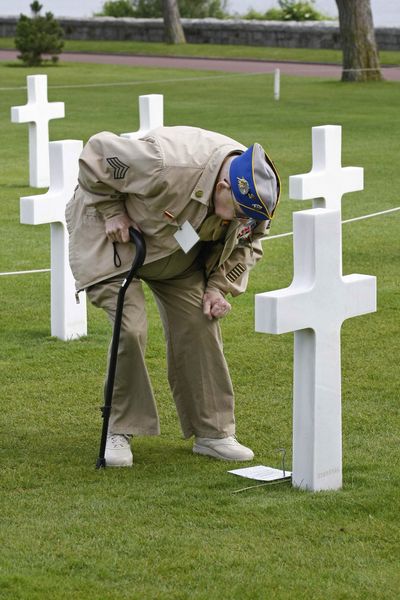D-Day event held in remembrance
Statue unveiling pays tribute to those who fought

SAINTE-MARIE-DU- MONT, France – With World War II-era military planes darting overhead and Normandy’s Utah Beach visible in the distance, a bronze statue emerged from beneath a camouflage parachute, in tribute to a man whose quiet leadership was chronicled in the book and television series “Band of Brothers.”
The unveiling of the Colorado-made statue of Pennsylvania native Maj. Dick Winters was one of many events marking Wednesday’s 68th anniversary of D-Day, the Allied operation that paved the way for the end of the war.
The 12-foot tall bronze statue in the Normandy village of Sainte-Marie-du-Mont shows Winters with his weapon at the ready. But Winters – a native of Ephrata, Pa., who died last year at age 92 – only accepted serving as the statue’s likeness after monument planners agreed to dedicate it to the memory of all junior U.S. military officers who served that day.
“There were many Dick Winters in this war, and all deserve the bronze and glory of a statue,” said former Pennsylvania Gov. Tom Ridge, present as the bronze statue, draped in a camouflage parachute, was unveiled.
Also attending were four or five D-Day vets, including two who served in Winters’ “Easy Company,” Al Mampre and Herb Suerth Jr.
Winters “was a humble, simple person thrust into a position of leadership in which he excelled,” said Suerth, who heads the association of former Easy Company vets, only 19 of whom survive.
The statue was made in Loveland, Colo., and transported here, to a roadside between the village of Sainte-Marie-du-Mont and Utah Beach, distant but visible behind the statue.
It was here that Winters and his small band of men dropped out of the sky soon after midnight on June 6, 1944, on a death-defying mission to destroy four German 105mm artillery guns that threatened the Allied invasion force.
Tens of thousands of Allied and German forces were killed in the D-Day invasion and ensuing Battle of Normandy.
French President Francois Hollande, paying tribute Wednesday to the soldiers who took part in the D-Day invasion, spoke of the European unity born from the horrors of World War II – and that is strained today by financial crisis and tensions over Muslim immigration.
“Normandy is covered with the tombs of children from all of Europe. All Europeans … should be capable, 68 years later, of bringing Europe peace, solidarity and progress,” he said. “Only the emergence of a common European conscience will protect us against the return of hate.”